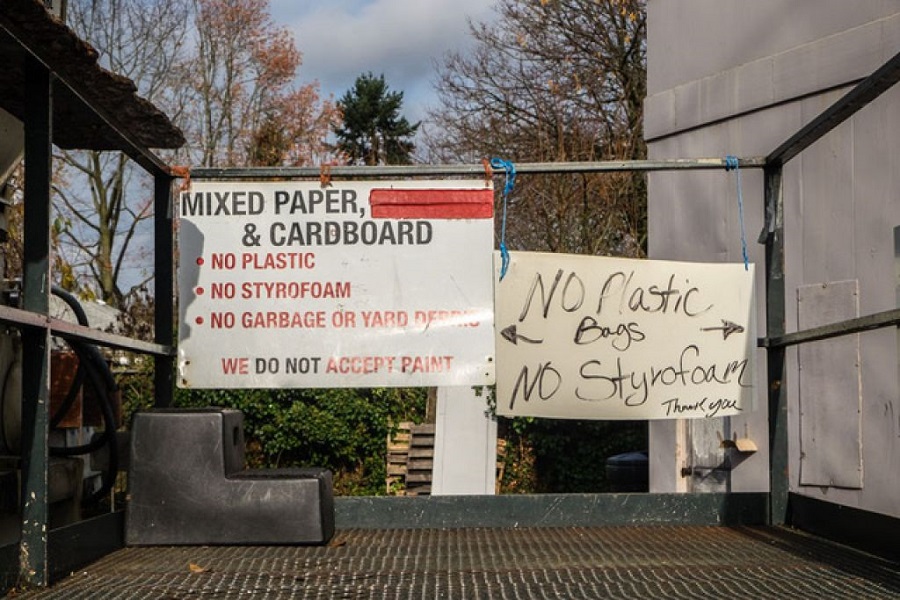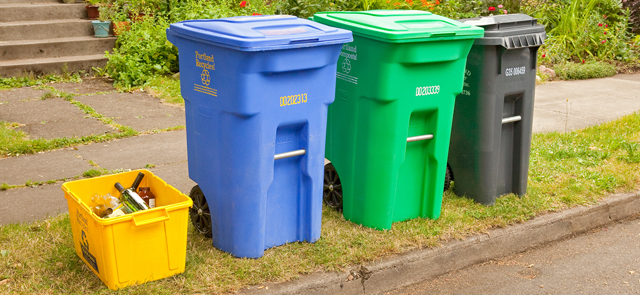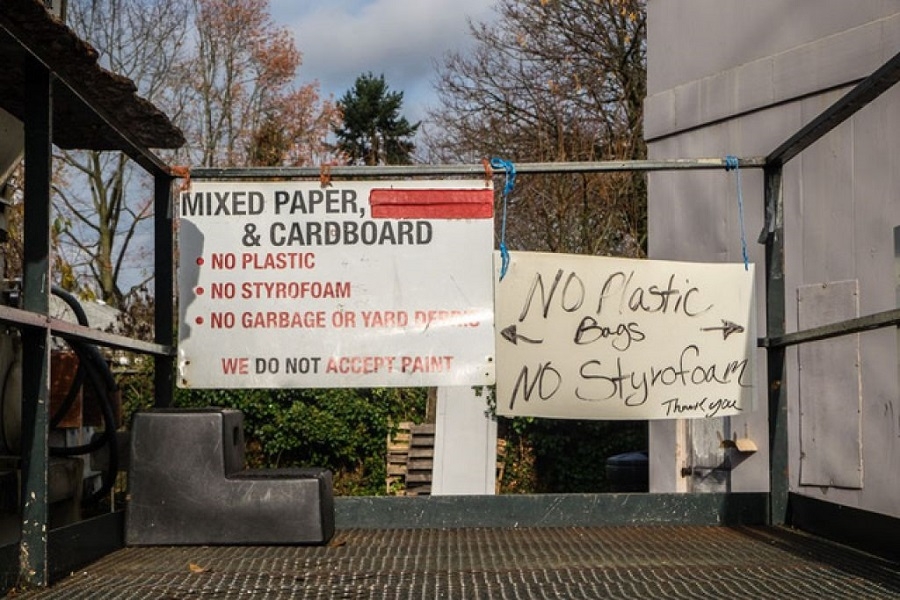Officials search for solutions to China’s ban on U.S. imports of recyclable waste.
Like states all over the country, Oregon is struggling to deal with the excess recyclable plastic and mixed paper that have accumulated since China banned U.S. imports of these materials at the beginning of the year.
But recycling businesses are hopeful the ban will turn out positively for their sector.
Nicole Janssen, president of Denton Plastics in Gresham, hopes the disruption will start a conversation about how the U.S. tackles recyclable materials domestically.
“It is opening up opportunities for figuring out how to deal with post-consumer waste,” she says.
Her business, which turns plastic waste into usable products, has yet to benefit from the China ban because Oregon does not have a facility that separates plastics she can use for her business’s own processing.
The state’s material recovery facilities (MRFs), private businesses that sort recyclable materials, discard most of the waste that comes to them after they separate it for high-value materials, such as cardboard, milk jugs and soda bottles.
This waste, often contaminated with non-recyclable material, such as yard debris and food scraps, used to be shipped off to China, which sorted the waste and used it as feedstock for its manufacturing base.
 Jason Kaplan
Jason Kaplan
In 2018, China banned the imports of post-consumer plastics and unsorted paper because of the high rate of contamination, which polluted their environment and harmed public health and safety. The low cost of oil also means it is less economic to recycle plastic since it is cheaper to produce virgin plastic.
Janssen says her facility could use about 50% of the recyclable plastic that is discarded by the MRFs and used to get sent to China. But few domestic organizations are willing to sort that material.
“We have had more people cleaning up the waste stream. But it is not a huge amount. People feel they do not want to pay for the extra labor to separate the material. They are just taking it to the landfill,” says Janssen.
RELATED STORY: ONE COUNTRY’S TRASH IS ANOTHER COUNTRY’S….WELL, TRASH
Pete Chism-Winfield, chair of the Association of Oregon Recyclers, says 40% of Oregon’s recyclable materials that used to go to China are now being exported to other countries, such as Vietnam and India. A portion of it is also now going to the landfill because MRFs are overwhelmed with the amount of waste material piling up at their facilities.
The Department of Environmental Quality (DEQ) reports that 5-6% of co-mingled material collected in the blue trash carts for recycling is going to the landfill. The actual amount going to the landfill is probably higher because several counties outside of Portland are no longer collecting recyclable material and are sending it straight to the landfill.
Counties that have sent a portion of material collected for recycling to the landfill over the past six months include Hood River, Wasco, Sherman, Gilliam and Crook counties, as well as the City of Roseburg and Pendleton.
“We need to do more processing domestically. We are trying to figure out how to process [the waste] in Oregon,” says Chism-Winfield, who also works as a program specialist for the City of Portland.
Part of the solution lies with local governments, which have a role in better educating the public on how to recycle. A big issue is people are not cleaning recyclable materials like food packaging before discarding in the blue recycling trash carts, said Julie Miller, a DEQ spokeswoman. The contamination spoils mixed paper in particular, which makes it unsuitable for recycling.
 The City of Portland Roll carts at the curb
The City of Portland Roll carts at the curb
Another solution would be more separation of recyclable material at the curbside. Requiring that mixed paper is kept separated from plastics, for example, would help to reduce the contamination rate.
Recycling mixed paper, the biggest volume of recyclable material, is actually more expensive than plastics recycling. It costs around $1 billion to build a paper mill that could process mixed paper. Several paper mills have gone out of business in Oregon because they were not able to compete with overseas markets.
“Solutions for plastics are more cost effective. The investment needed is not so much,” says Chism-Winfield.
More transparency about what happens to recyclable waste after it is sent overseas could also help raise public awareness. “Is there anyone from Oregon seeing if the processing is getting handled properly overseas?” asks Chism-Winfield. “People want more transparency, but there is no system in place to track it.”
The most effective long-term solution is creating more incentives for producers to manufacture products that don’t create as much waste, say experts. The low cost of energy in the U.S. means recycling plastics is no longer an effective solution.
“We have arrived at a conundrum where the recycled material is more expensive than virgin plastic,” says Daniella Russo, the CEO of Think Beyond Plastic, an incubator that supports businesses that manufacture alternatives to plastic. “If we want to solve the problem of plastic pollution we need to look into the use of different materials.”
RELATED STORY: ‘OCEANS AND WATERWAYS HAVE NO CHANCE OF SURVIVAL AT THE PRESENT RATE’
Jennifer Coleman, health communications and outreach director at the Oregon Environmental Council, says producers could be held more responsible. “Folks that make single-use plastic packaging are focused on the presentation, but they are not looking at the product lifecycle. We need to hold manufacturers responsible for that design.”
Manufacturers that produce alternatives to plastics packaging stand to benefit from the increased pressure on local governments to process waste domestically.
Chris Vitello, the CEO of ECNow Tech, an Albany maker of compostable and reusable food service products, is seeing more interest from customers in buying plant-based food service items, such as compostable plates, utensils and cups.
He says customers are disturbed by the increase in plastic waste going to the landfill and feel less bad about compostable material being discarded this way.
“A lot of customers are saying they would rather send a plant-based product to the landfill. They still feel better about it,” says Vitello.
The CEO is also seeing more interest from big corporations and universities using reusable food service items in their cafeterias rather than compostable or single-use plastics. “Customers are looking for better solutions on how to reduce the waste stream.”
As Oregon’s waste problem escalates, local governments are increasingly looking to the private sector for solutions.
“This ban in China has people looking at long-term planning,” says Janssen.








